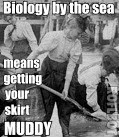Carl Sagan on science and belief: There's a lot we don't know. It's what I believe. But that doesn't mean that every fraudulent claim has to be accepted. We demand the most rigorous standards of evidence especially on what's important to us.
This exchange exemplifies one of the things I think is best about Carl Sagan, and one of the things I intend to emulate as an educator and a scientist. Carl is great at the charismatic, empathetic emotional communication. In order to make this point about how important it is that we demand evidence for the thing we want to be true, he goes deeply personal -- he talks about how much he misses his parents, and how much he wants to just speak with them again for five minutes. His voice breaks a little when he says it. He brings authenticity to the conversation simply by being unabashedly and almost naively authentic. He says this, and you know how he must feel, because he communicates with everything he is how he feels. And when he says, 'because I want to speak with them again so badly, I have to demand rigorous evidence from anyone who says they can do that for me,' you know that he's right.
What I intend to emulate is his ability to communicate authentically by being unafraid to be authentic. No rancor, no anger, just sincerity.
